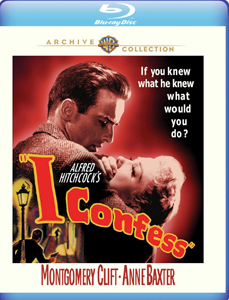Alfred Hitchcock is the Master of Suspense, but it’s when he’s working from a masterfully plotted screenplay that his films rise to the next level. One of my favorites of this type is “Dial M for Murder,” but he also delivered one a year before that with “I Confess” (1953).
In what scenario would someone know who committed a murder yet stay quiet even when they themselves are accused, charged and prosecuted? One answer: A priest who hears the murderer in confession. That’s the plight of Quebec-based Father Logan, given understated gravity by Montgomery Clift, who projects pained thoughts even when silent.
Hitchcock and screenwriters George Tabori and William Archibald (adapting a play by Paul Anthelme) pull off a neat trick. We know whodunit: rectory employee Otto Keller (O.E. Hasse). Why know why: to steal money. We know when and how.

“I Confess” (1953)
Director: Alfred Hitchcock
Writers: George Tabori, William Archibald (screenplay); Paul Anthelme (play)
Stars: Montgomery Clift, Anne Baxter, Karl Malden
Instead of a howcatchem, it’s a “how catch the wrong guy,” because evidence in the murder of lawyer Villette (Ovila Légaré) – accidental and manufactured – points to Logan. Playing behind that is also the question of “how they gonna catch the right guy.”
Trapped in the confessional booth
“I Confess” starts off rather grim, in black and white, with ominous shots of cathedrals. Churches aren’t the most inviting places here, as if cinematographer Robert Burks wants to show them as grand traps for Logan. That confession booth might just as well be Logan’s prison cell, it seems.
But then it becomes a great character piece. Logan is a rare character who is morally upstanding throughout, yet is fascinating. If he can’t continue to thread this needle, we want him to turn Keller in; he shouldn’t take the fall for a murderer. Logan is a better person than we are.
When we learn the background to his alibi via flashbacks — that he spent the night with his childhood sweetheart Ruth Grandfort (Anne Baxter) – it comes with the most innocent possible trappings. They were caught in a rainstorm, he didn’t know she was married, he wasn’t a priest yet, and they didn’t do anything untoward anyway.
Probably a more modern remake would give Logan some flaws. But while his utter perfection – he also goes off to fight in World War II for his country, even if it means sacrificing his relationship with Ruth — does date the film, it’s also an instructive time capsule of the morals of the time.
A crazy situation grows from logical actions
And as with “Dial M for Murder,” everyone’s actions make sense, as Hitchcock demonstrates that an insane situation can grow out of everyone acting rationally from their own POV. Keller isn’t even pure evil; he’s desperate and frustrated that his wife has to work grueling hours. The fact that his German nationality hampers his job prospects in 1950s Canada is certainly unfair.

While occasionally I want to yell at the police to think a little deeper and surmise why Logan is keeping his lips zipped, they investigate thoroughly rather than jumping to conclusions. Indeed, Inspector Larrue (Karl Malden) is frustrated that Logan won’t give information to clear his name. “I Confess” is remarkably compelling considering how many scenes consist of Logan saying nothing in the face of questioning.
While every character is portrayed sympathetically (see also Roger Dann as Pierre, who stands by wife Ruth’s side even though she doesn’t love him), “I Confess” takes society to task. The standard “Has the jury reached a verdict?” moment is followed by a twist that comments on the court of public opinion – and how public opinion often resembles uninformed mob mentality, and how even supposedly upstanding figures such as judges can contribute to this.
Despite giving us so much information up front, “I Confess” maintains its “How will it be resolved?” mystery until “The End” comes across the screen. It starts with the big question of whether we could be as morally flawless in Logan’s situation and spins off plenty of other questions, making this a sneakily engrossing and powerful Hitchcock gem.
RFMC’s Alfred Hitchcock series reviews works by the Master of Suspense, plus remakes and source material. Click here to visit our Hitchcock Zone.

